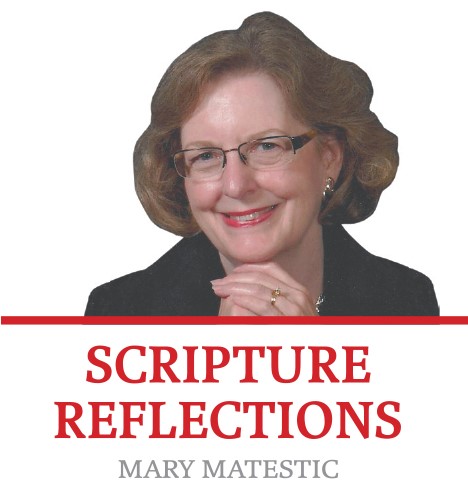Scripture Readings, Sunday, March 12, 2023
March 12, 2023
Third Sunday of Lent
Exodus 17:3-7
Romans 5:1-2, 5-8
John 4:5-42
The narrowness of the human heart finds it easy to succumb to hatred — to despise someone or some group for a past transgression, or maybe because history has legitimized disdain for another race, clan or culture. I cannot tell you how many families continue to be broken because of a blip in the human dynamic that occurred years ago. We have all felt the overpowering anger that leads to the temptation to terminally end a relationship, often holding on to the pain of unforgiveness. Yet, the word of God is clear: love transcends hatred. Faith in God’s mercy says that before we offer our gift at the altar, to go and be reconciled with our brother or sister, so that our sacrifice can be pleasing to God. (Matthew 5:24) “Rend your hearts, not your garments,” says the prophet Joel.
The enigmatic story of Jesus and the Samaritan woman is a reach back in history to repair a breach, which left the Samaritan people and the Hebrew people at enmity with one another for centuries. Why is this important to Jesus? Because he has come for the salvation of all peoples, Jews and Gentiles alike. God proves his love for all of us because, while we were still sinners, Christ died for all. So the right to exclude others, to look upon another people or community with condescension, is over. But the struggle still exists.
And perhaps that kind of loving world view is just what “living water” is all about.
So why did Jesus stop to talk to a Samaritan, a Samaritan woman with a checkered past?
Was he thirsty for water? Or thirsty for reconciliation among a people kept at arm’s length? It’s important when we are reading from John’s Gospel that we are aware that there are several levels of meaning within the story. Dr. Brant Pitre in his book, “Jesus, the Bridegroom,” suggests that the story of the woman at the well is a bridal story. In antiquity, wells were meeting places for patriarchs and their brides. Moses met Reuel’s daughters at the well, who lead him to his wife, Zipporah. (Exodus 2:15-22) Jacob and Rachel met at a well (Genesis 29:1-14), Abraham’s servant met Rebekah at a well, and ultimately, she married Abraham’s son, Isaac. (Genesis 24:10-27)
It is Jesus who approaches the woman. He initiates contact and engages her in a long dialogue, uncovering her story. He is alone with her. It is customary for the bridegroom to offer his betrothed a gift. Jesus offers the woman “living water.” He asks her to call her husband and she says she has no husband, an interesting remark since she has had five, and the one she is living with is not her husband.
Here is the backstory on this event. Long before this woman was born, the Israelites were taken into captivity by the king of Assyria, and he stealthily scattered the captives, moving large populations of countries to different locations. He moved most of the people of Judah to Babylon and resettled other people in their place. With their homeland almost vacant, the Jewish scribes and able-bodied people moved into the plantations on the rolling hills of Samaria. The Jewish people ultimately intermarried with the Samaritans and further worshiped their five dominant male gods, including Marduk, Tartak and Negal. Still, they kept some loyalty to Yahweh, but he was just another god among many. The term “Baal” (or false god) means “husband.”
Metaphorically then, the Samaritan woman represents all of rejected Samaria, who had a history of worshiping five false “Baals.” Jesus came to mend the breach. The one husband left whom she is living with represents Yahweh, with whom Samaria has a conflicted relationship.
Years later, the Jews returned to Jerusalem; the Samaritans came to help rebuild Jerusalem. However, those who remained faithful to Yahweh cast the Samaritans out and despised them for their intermarriage and their complicity with false deities. Thus, the Samaritans built their own temple on Mt. Gerizim, and over the next hundreds of years, the feud grew, and the Jewish people would rather cross the Jordan River than pass through Samaria.
So, hatred affected travel, geography, worship, ancestral history and human relationships. Jesus would not collude with this history, and he chose to marry Samaria and make it his own bride.
As I thought about our world today, I felt we are in some ways like Samaria. Our culture has many gods. Scores of people have left their places of worship. We are tragically aware that the distance between God and our fidelity to him has grown wider. We worship the gods of fame and fashion, we worship the gods of sports stars and rock stars, we spend inordinate amounts of time before screens, and we snuggle up to pleasure and power, jealousy and greed. And by the way, if there is time, we might go to church on Christmas or Easter.
Yet, even though we wander far away, it is the Lord who finds us and invites us to drink living water. We might wonder where to find that living water. I suspect it flows from the side of Jesus, the pierced bridegroom, still dripping with love and a desire to melt all hatred.
It was Samaria’s bridal gift. And now, it is ours.

